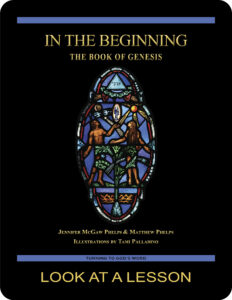let no person separate
 In the tenth chapter of the Gospel According to Mark (NABRE), we encounter Jesus’ talk about marriage. Included is this odd line in the Gospel According to Mark 10:9 (NABRE): “Therefore what God has joined together, no human being must separate.” This translation comes about by trying to translate a grammatical form that doesn’t exist in the English language.
In the tenth chapter of the Gospel According to Mark (NABRE), we encounter Jesus’ talk about marriage. Included is this odd line in the Gospel According to Mark 10:9 (NABRE): “Therefore what God has joined together, no human being must separate.” This translation comes about by trying to translate a grammatical form that doesn’t exist in the English language.
First let’s look at what this English phrase is saying. The problematic section is “no human being must separate.” It looks in English as though Jesus is saying that if God joins something we don’t have to separate it (but we can). From the broader context of the passage about the legality of divorce, we know that’s not what Jesus meant.
In Greek, this phrase is much clearer but not in a way that’s easy to translate because it uses a third-person imperative, a grammatical structure that doesn’t exist in English. Our imperatives (or commands) always are addressed directly to a person or group of people and so always are second-person. “You, go to the store.” “All of you, get out of here.” In English, we can’t command something without addressing it directly. This is not true in Greek. God is commanding humanity not to separate what he has joined. Probably a clearer translation would be: “Therefore what God has joined together, let no person separate.”
related topics: judgment; subordinate
you also may like our study of the book of Genesis
 The first seven lessons of In the Beginning: The Book of Genesis, a 28-lesson Catholic Bible study with an imprimatur, provide an in-depth look at the very earliest biblical history—including the two accounts of Creation, events surrounding the Fall of Adam and Eve, the relationship between Cain and Abel, and the baptismal foreshadowing present in the account of Noah and the Flood. Remaining lessons look at lives of the patriarchs Abraham, Isaac, Jacob, and Joseph. Click on the book’s cover to view a sample lesson.
The first seven lessons of In the Beginning: The Book of Genesis, a 28-lesson Catholic Bible study with an imprimatur, provide an in-depth look at the very earliest biblical history—including the two accounts of Creation, events surrounding the Fall of Adam and Eve, the relationship between Cain and Abel, and the baptismal foreshadowing present in the account of Noah and the Flood. Remaining lessons look at lives of the patriarchs Abraham, Isaac, Jacob, and Joseph. Click on the book’s cover to view a sample lesson.
 Click on the picture of the statue of Moses with horns (above) to learn more about Lost in Translation. A new entry is archived each Monday. Contact us to receive Lost in Translation by email every week. You may use any of the contact links on our website to ask Matthew a question.
Click on the picture of the statue of Moses with horns (above) to learn more about Lost in Translation. A new entry is archived each Monday. Contact us to receive Lost in Translation by email every week. You may use any of the contact links on our website to ask Matthew a question.
